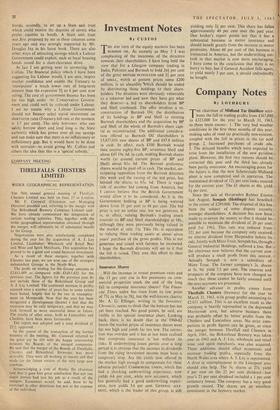In vestmen t Notes
By CUSTOS
rr HE star turn of the equity markets has been BURMAH ou... As recently as May 3 I was complaining of the meanness of the directors
towards their shareholders. I have long held the view that for a Glasgow company trading in India, Pakistan and Burmah to hold 241 per cent
of the great BRITISH PETROLEUM and 31 per cent of SHELL, worth at present prices some £200 million, is an 'absurdity "Which should be ended
by distributing those holdings to their share- holders. The directors were obviously vulnerable to a takeover bid and now they have, got what they deserve—a bid to shareholders. from BP and Shell combined. The offer involves a re- construction of Burmah Oil, the distribution
of its holdings in BP and Shell to existing Burmah shareholders and the acquisition by BP and Shell of the whole of Burmah's share capi- tal as reconstructed. The additional considera- tion offered to Burmah Oil shareholders is 15,837,016 new shares of BP and £47.8 million in cash. In effect, each £100 Burmah would then receive eighty-five BP, seventeen Shell and about £45 19s. 6d. in cash, making Burmah shares worth (at around current prices of BP and Shell) about 61s. 6d. The Burmah preference shares would be paid off in cash. The market, an- ticipating opposition from the Burmah directors this week and the raising of the bid price, has hoisted the' shares to 65s. 6d. There is vague talk of another bid coming from America, but I cannot believe that the British Government would allow it to be considered. As it is, the Government holding in BP is being watered down from 51 per cent to 48 per cent. The bid price is not an unfair one, but not generous. It is, in effect, valuing Burmah's trading assets (outside its BP and Shell shareholdings) at 18s., although they were previously being valued in the market at only 1 Is. This 18s. iS equivalent to valuing these trading assets at about seven years' purchase of the gross profits. This is not generous and could with fairness be increased. I hope the Burmah directors will see to it that the bid is raised. They owe this effort to their shareholders.
Insurance Shares
Will the increase in motor premium rates and the 15 per cent rise in fire premiums on com- mercial properties mark the end of the long fall in composite insurance shares? The Finan- cial Times index has risen from its low point of 131 in May to 781, but the well-known chartist Mr. A. G. Ellinger, writing in the Investors' Chronicle, seems to think that the bottom has not yet been reached. No good points, he said, are visible in his special insurance chart. Looking back, there is no doubt that in the 1960-62 boom the market prices of insurance shares went far too high and yields far too low. The correc- tion was overdue and it has at last been realised that composite insurance is not without its risks. If underwriting losses persist over a long period it is obvious that the increase in dividends from the rising investment income must have a temporary stop. Are the yields now offered in the market high enough to compensate for these adverse periods? COMMERCIAL UNION, which has had a shocking underwriting experience, now yields 4.6 per cent, while SUN ALLIANCE, which has generally had a good underwriting experi- ence, now yields 3.6 per cent. GENERAL ACCI- DENT, which is the leader of this group, is still yielding only 21 per cent. This share has fallen approximately 40 per cent over the past year. One broker's report points out that it has a substantial business in motor insurance and should benefit greatly from the increase in motor premiums. About 60 per cent of this business is transacted in America, but the underwriting out- look in that market is now more encouraging. I have come to the conclusion that there is no hurry to buy, but if General Accident falls again, to yield nearly 3 per cent, it should undoubtedly be bought.






































 Previous page
Previous page